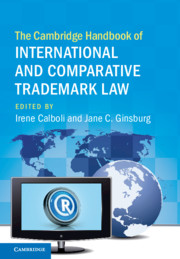Book contents
- The Cambridge Handbook of International and Comparative Trademark Law
- The Cambridge Handbook of International and Comparative Trademark Law
- Copyright page
- Contents
- Editors and Contributors
- Foreword
- Preface
- Part One International Aspects of Trademark Protection
- Part Two Comparative Perspectives on Trademark Protection
- I The Nature and Functions of Trademarks
- II Signs That Can Be Protected as Trademarks
- III Public Policy Limitations of Trademark Subject Matter
- IV The Relationship between Trademarks and Geographical Indications
- V Certification and Collective Marks
- VI The Relationship between Trademark Law and Advertising Law
- VII The Relationship between Trademark Law and the Right of Publicity
- VIII Trademarks and Domain Names
- IX Overlapping Rights
- X Theories Underlying the Standards for Trademark Infringement
- XI Trademark Dilution
- XII Secondary Trademark Liability
- XIII Trademark Defenses
- 33 Valuing the Freedom of Speech and the Freedom to Compete in Defenses to Trademark and Related Claims in the United States
- 34 Limitations to Trademark Protection as Defences to Infringement
- XIV The Principle of Exhaustion of Trademark Rights
- XV Trademark Transactions
- Index
33 - Valuing the Freedom of Speech and the Freedom to Compete in Defenses to Trademark and Related Claims in the United States
from XIII - Trademark Defenses
Published online by Cambridge University Press: 18 September 2020
- The Cambridge Handbook of International and Comparative Trademark Law
- The Cambridge Handbook of International and Comparative Trademark Law
- Copyright page
- Contents
- Editors and Contributors
- Foreword
- Preface
- Part One International Aspects of Trademark Protection
- Part Two Comparative Perspectives on Trademark Protection
- I The Nature and Functions of Trademarks
- II Signs That Can Be Protected as Trademarks
- III Public Policy Limitations of Trademark Subject Matter
- IV The Relationship between Trademarks and Geographical Indications
- V Certification and Collective Marks
- VI The Relationship between Trademark Law and Advertising Law
- VII The Relationship between Trademark Law and the Right of Publicity
- VIII Trademarks and Domain Names
- IX Overlapping Rights
- X Theories Underlying the Standards for Trademark Infringement
- XI Trademark Dilution
- XII Secondary Trademark Liability
- XIII Trademark Defenses
- 33 Valuing the Freedom of Speech and the Freedom to Compete in Defenses to Trademark and Related Claims in the United States
- 34 Limitations to Trademark Protection as Defences to Infringement
- XIV The Principle of Exhaustion of Trademark Rights
- XV Trademark Transactions
- Index
Summary
Trademark and related unfair competition laws promote fair competition and protect goodwill but do not do so by providing broad monopoly rights. Instead, rights to a particular mark are limited to leave room for competitors, the dissemination of information, and the production of creative expression and commentary. This latitude is protected in part by limits on the scope of the rights afforded, but also by defenses to these claims. This chapter primarily considers affirmative defenses to trademark infringement, trademark dilution, and false endorsement claims, focusing on defenses that serve the goals of free expression and fair competition. These free-speech-based defenses should be of particular interest to comparative law scholars and non-US practitioners because of their unique and elevated status in US law. The First Amendment to the US Constitution expressly prohibits Congress (and by extension states) from making or enforcing laws that “abridg[e] the freedom of speech.” This foundational aspect of US law has influenced the development of and the interpretation of speech-based defenses to trademark and related claims.1
- Type
- Chapter
- Information
- Publisher: Cambridge University PressPrint publication year: 2020



